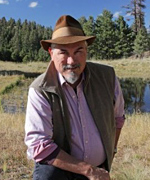 —Alan Dulaney
—Alan Dulaney
The legislative picture in January had a focus on water issues. Almost 40 bills were introduced that dealt with water, and the probabilities of passage of many of them seemed high. Then came the madness of March, and most of these bills got trampled in the legislative stampede to get out of town. Now it seems unlikely that water issues will again assume a prominent position, possibly for some time to come.
As is obvious to anyone viewing empty parking lots and light traffic loads, the viral pandemic and the state lockdown have quickly trashed what was only two months ago a strong economy. Despite discussions on the rate of economic recovery, with a V or U or W-shaped graph, no one really knows what will happen in the rest of 2020. But it won’t be considered a good year, and recession is the likely reality.
So how are Arizona Hydrological Society folks navigating these new shoals of uncertainty? A few calls to various consultants, labs, and drilling firms, plus some government workers, shows that the economic impact of lockdowns and closures associated with the COVID-19 crisis are currently minimal for hydrologists and water resources professionals. Consultants appear to be operating with minimal disruptions. In large part, this is because professionals can usually work at home, avoiding crowds amongst which the virus can be spread. So, the office is empty. Even field techs are relatively safe, as sampling activities are often well separated from any potential human contact, and techs are not sharing their trucks anymore. Contracts are not being cancelled, as projects (especially environmental) are long-term and must continue. However, there are concerns about future funding from the clients; if ADEQ, for example, gets its funding cut in a drastically revised state budget, this could be reflected in contracts for consultants. Copper prices are way down, and mining corporations might decide to cut consulting costs. Likewise, oil companies, faced with falling prices, could also delay capital spending on consultants. But many private firms will continue to need consultants, and no one seems to be laying people off right now.
Labs have a steady business in environmental analysis. Yes, samples may be dropped off outside the door now, and picked up by lab folks with their own PPE, but water and soil samples will continue to be analyzed. This is an ongoing operational expense, not a capital cost.
Unfortunately, drilling is often seen as a capital cost, and can be delayed or cancelled. Some drilling firms could be looking at significant disruptions in their business. Copper prices have been declining steeply since January, along with oil; exploration budgets and the wells they finance can be expected to decline too. After the passage of DCP in 2019, and the promises of millions of dollars for new wells, it was expected that demand for irrigation wells would be accelerated, and it is not clear why new wells are not being drilled in the anticipated numbers. Municipal providers are facing unexpected shortfalls in sales tax revenues. The enterprise funds which support water services may be subject to unexpected fiscal raids or sweeps this year. Capital costs are part of water services’ budgets, and providers are undoubtedly scrambling to revise forecasts and cut costs. It comes down to money, and drilling firms may feel the impact long before consultants and labs.
To be clear, municipal and private providers will continue to provide a reliable and safe supply of water, as noted here. There is no evidence that COVID-19 is transmitted through drinking water.
Yet water remains a critical issue for Arizona and the West. Hydrologists and water professionals will continue to be needed for the foreseeable future, no matter what the current situation looks like.
There is much talk about societal change after the first wave of viral infections abates. For many, telecommuting may become a permanent feature of the workplace. Travel may be cut back. Online meetings may become the norm. Yet reduced interactions with one’s peers can reduce one’s development as a water professional. Networking (both online and in person when finally allowed) is needed to find out what is happening with one’s area of concern, and what new knowledge should be sought out. The Arizona Hydrological Society will continue to provide and enhance the opportunities for professional development through networking, symposia, chapter meetings and whatever virtual venues can be developed. We are essential.